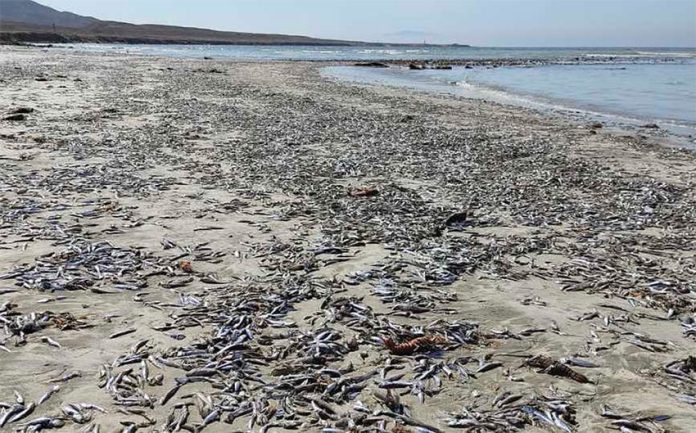Thousands of tonnes of dead sardines as well as other fish and marine life washed up on the northern Pacific coast of Baja California Sur over the weekend in an event described by local environmentalists as the state’s worst ever marine ecological tragedy.
Massive quantities of sardines as well as smaller amounts of other fish such as combers and anchovies along with sea cucumbers and lobsters, some of which were still alive, washed up on beaches on Sebastián Vizcaíno Bay, located off the northwest coast of the municipality of Mulegé.
According to local media reports, about 15 kilometers of coastline were covered with dead sardines that attracted hungry seagulls and even coyotes. Locals told the newspaper El Sudcaliforniano that the event was unprecedented in terms of its magnitude.
Fernando García Romero, an official with the Baja California Sur Ministry of Fisheries, said the die-off was caused by high ocean temperatures. The hotter than usual temperature of the water caused hypoxia – inadequate oxygen supply – in the deceased fish and marine life, he said.
Locals who returned lobsters to the sea noted that the water was much hotter than normal and a cloudy brown color, indicating a lack of oxygen. Local fishing union leader Benito Emeterio López attributed the die-off to climate change and a current of hot water that originated in Japan.
The temperature of the water off the Baja California coast is normally 18-22 C but reached 30 C in the area where the dead sardines washed ashore, according to local fishing cooperatives. The temperature has since returned to normal.
The newspaper Milenio reported that the discovery of the thousands of tonnes of dead fish “was described by several local environmentalists as the biggest ecological tragedy recorded on the coast of Baja California Sur.”
Local fishermen said that there was a possibility that large quantities of other marine species, such as clams, mussels and sea snails, were also killed, even though they didn’t wash up on beaches. There is also concern that abalone stocks – upon which the livelihoods of hundreds of families depend – may have been adversely affected by the high water temperature.
Jesús Camacho, former president of the Mexican Confederation of Fishing Cooperatives, said that a similar hot water phenomenon occurred on the Pacific coast in 1992, causing the deaths of marine creatures – including abalone – and “enormous economic losses.”
Fishermen and environmentalists said that high levels of contamination in the water may have also been a factor in the recent incident.
Aníbal Lucero, leader of a fishing cooperative, said there was concern among fishermen that a similar event could happen on other stretches of the Pacific coast. When a hot water current arrives, history shows that it kills most of the marine creatures in its path, she said.
With reports from Milenio, BCS Noticias and El Informante
